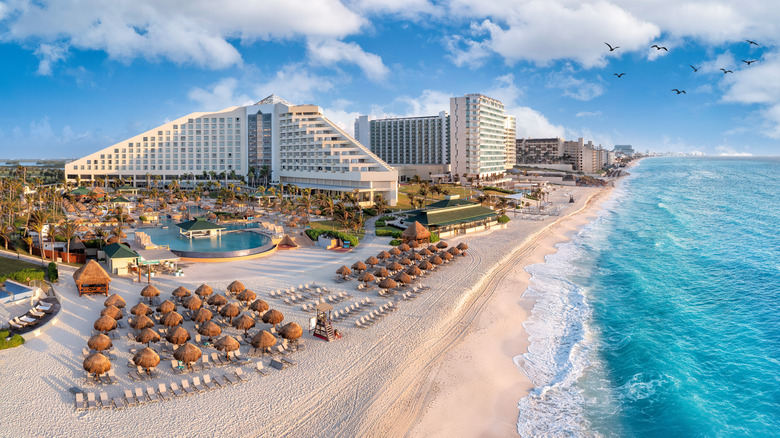Mamitas Beach (Playa Del Carmen, Mexico)
If your desires include drinking cocktails throughout the day and dancing all night, then Playa Del Carmen is the perfect resort city for you. The unbridled excitement found on Mamitas Beach is carried by its youthful demographic, where watersports dominate the ocean and vibrant bars pump tunes directly next to the sand. Moreover, the party only continues to expand. In fact, the Guinness World Records recognizes Playa Del Carmen as Latin America’s fastest-growing community, at a 25% increase every year!
Of course, this madness is not everyone’s scene. Some prefer to read a book while lounging beneath the sun’s rays, and they may struggle with the banging music interrupting their every page turn. In such cases, it is probably best to skip over this area and try to find something better suited to your tranquil needs. Fortunately, you won’t have to look far, as Mexico boasts many charming vacation spots nationwide.
Tiger Beach (West End, Bahamas)
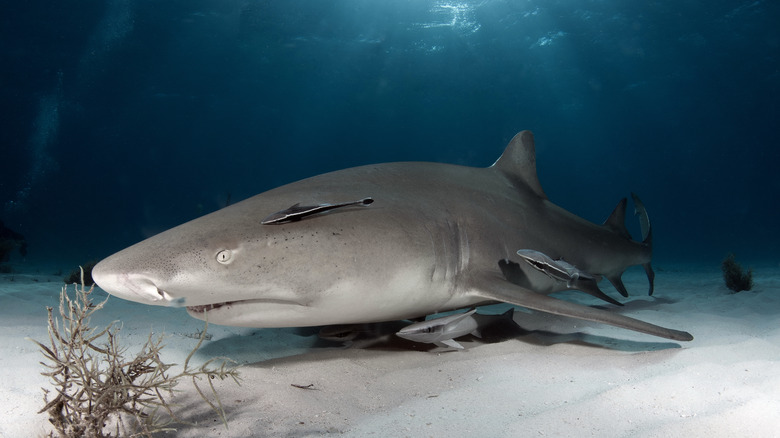
The capital of Grand Bahama, West End, is a joyous stopover for any explorers of the Bahamas. Coming from the United States, it is usually the first port of call, meaning easy accessibility. It is also the oldest town on the island, with a long history of bountiful fishing — so much so that various celebrities have been regular visitors, such as Ernest Hemingway, Richard Nixon, and Martin Luther King Jr. Yet above these boasting points is the allure of clear oceans spreading out from expansive beaches. That is, if you’re not afraid of sharks.
Tiger Beach is known as the Caribbean’s most dangerous beach due to sharks. Aptly named, it has a higher concentration of tiger sharks than anywhere else but hides various other sharp-tooth breeds, including hammerheads, blacktips, and bull sharks. It’s enough to scare anyone from braving the scene, but statistics remain in your favor. In fact, The International Shark Attack File reports that there have only been 32 confirmed shark attacks in the Bahamas since 1749. This number is surprisingly small considering the vast amount of tourism the Grand Bahama sees. But if you can’t shake the theme music from “Jaws” out of your head, perhaps you might test the waters with one of their many cage-diving activities available.
Wahoo Bay (Haiti)
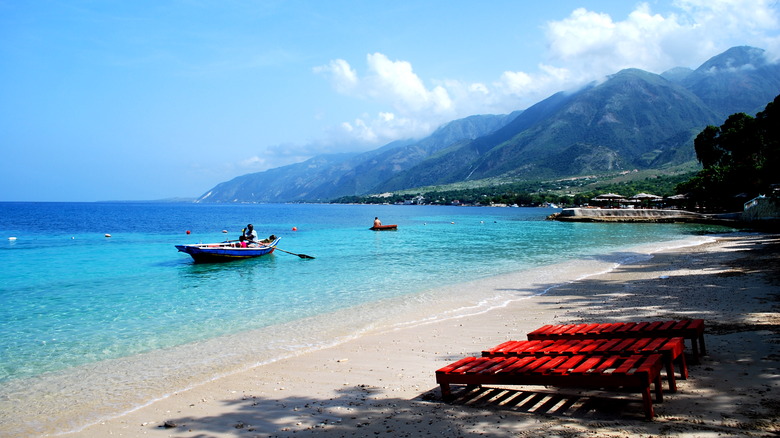
Josine Vervloet/Getty Images
Just over an hour from Haiti’s capital, Port-au-Prince, you will find Wahoo Bay, a small, quiet beach with rich sunset views and decent snorkeling opportunities. And with a name like Wahoo, what could go wrong? Sadly, these positives are heavily outweighed by the surrounding areas, as Haiti is widely reported as the most unsafe island in the Caribbean.
Due to heartbreaking poverty after the catastrophic earthquake of 2010, crime continues to soar on the island. According to Visions of Humanity, Haiti is the 129th most dangerous country in the world, with an emphasis on violent conflict and a high murder rate. Tourists are regularly targeted for kidnappings and ransom. Port-au-Prince is particularly troublesome, with incidents rising every year. For this reason, The U.S. Department of State has placed a Level 4 warning on Haiti, advising explorers not to travel there. It’s a pity because Wahoo Bay has hardworking security who try to keep the beach safe, but many believe it is not worth the risk.
Palm Beach (Aruba)
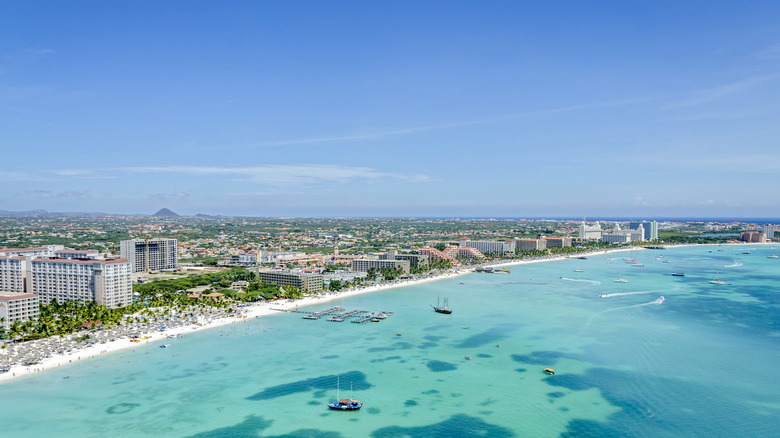
Jimmyvillalta/Getty Images
Aruba’s thriving tourist industry constitutes the majority of the country’s gross national product, pulling in over a billion dollars annually, with an estimated 7.6 tourists per resident. A large part of its appeal comes with its scenic presentation, offering more than a dozen beaches to catch a tan on. That said, none will test your patience as intensely as the world-famous Palm Beach.
As Aruba’s all-inclusive resort destination, Palm Beach has close to 5,000 rooms only a stone’s throw from the sand, which means a daily swarm of guests elbowing to locate a spot. It’s known to be noisy, squashed, and the polar opposite of a peaceful beach getaway. However, if you find yourself in this position, you could always embark on the six-minute drive (or gorgeous 40-minute walk) southward to Eagle Beach. It’s not going to be an abandoned space of tranquility either, but it should be a little quieter than its Palm neighbor.
Isla Verde (San Juan, Puerto Rico)
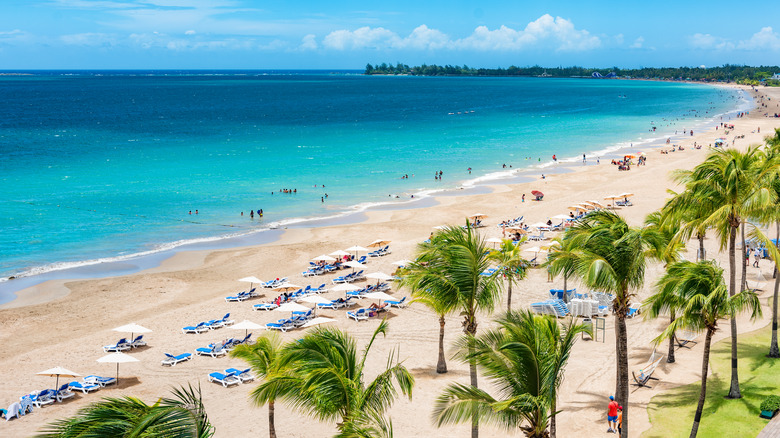
Maridav/Getty Images
The easiest way to calculate how packed a destination will be is to research the number of people who fly over their borders annually. In the case of Puerto Rico, you are looking at a whopping 10 million visitors each year. Simply put, it is one of the most favored destinations in the Caribbean by quite a number.
This island’s popularity is partly due to the nation’s passport laws. If you’re a United States citizen, you can waltz right through the gate, no questions asked. Of course, one person’s gift is another’s curse, and you might find yourself on a beach overrun by travelers who have the same idea as you.
Isla Verde is San Juan’s most congested beach, with bustling activity at any time of day or night. Thankfully, its three miles of sand mean you do have a chance to locate a patch to call your own. But even then, you may snap back to reality when an airplane roars over your head, as the airport is only a stone’s throw across the road.
Fox’s Bay (Montserrat, Leeward Islands)
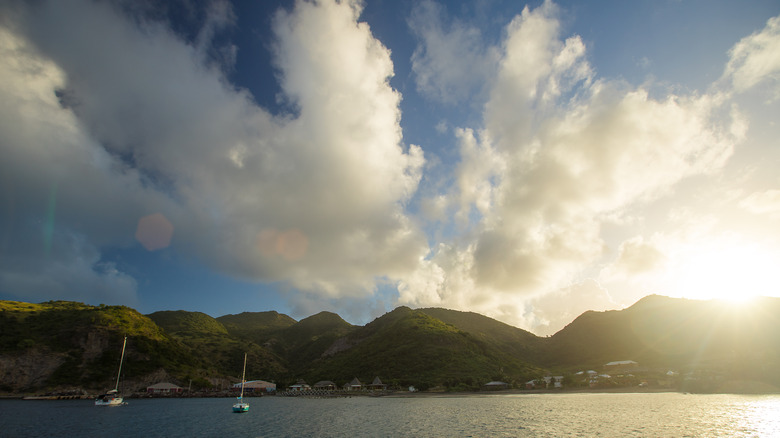
fotogestoeber/Shutterstock
The tourist appeal of Montserrat abruptly collapsed in July of 1995. The dormant Soufrière Hills volcano exploded to life, obliterating their former capital, Plymouth, which is now a ghost town. Two-thirds of the island fled, with Montserrat’s population remaining under 5,000 today, and the volcano is still active. The most recent volcanic event occurred in 2010, resulting in a dome collapse. This incident caused ash clouds to travel as far as the islands of Guadeloupe and Antigua.
Understandably, the Montserrat government enforced an exclusion zone, where a large section of the southern land remains off-limits to visitors. Due to these measures and the watchful eyes at the Montserrat Volcano Observatory, tourism has speedily increased. Certain areas have reopened, including Fox’s Bay, which straddles the exclusion line. Explorers love the quiet beach, which is unspoiled thanks to the years of restrictions. Nevertheless, if you are concerned about natural disasters occurring on your vacation, then Montserrat’s looming threats of volcanic eruptions may wreck your peace of mind.
Cabbage Beach (Nassau, Bahamas)
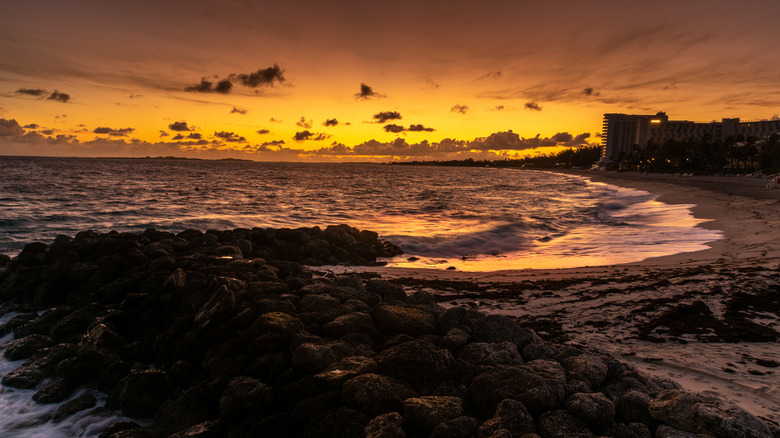
Kire Marinceski/Shutterstock
When writing up a checklist of reasons not to visit a place, Cabbage Beach ticks them all. For starters, it is situated on Paradise Island, just off the coast of the nation’s capital, Nassau. This easy access point, coupled with its postcard-esque scenery, makes Cabbage Beach one of the most visited destinations in the country. Naturally, this leads to the standard nuisances of overcrowding and disturbing noises, but another common complaint is the targeting of tourists by locals. People are constantly harassed by sellers looking to make a quick buck, and you’ll have to avoid frequent scam artists, too.
Even worse are the many cases of sexual assaults, which are often tied in with loosely regulated industries like watersports tours. If that’s not enough to scare you, then perhaps the fatal 2019 shark attack will. For a safer beach experience, you should head towards the island’s West Side. The best options include the ill-named Jaws Beach and the more comforting titled Love Beach, both of which are removed from the touristic bustle.
Doctor’s Cave Beach (Montego Bay, Jamaica)
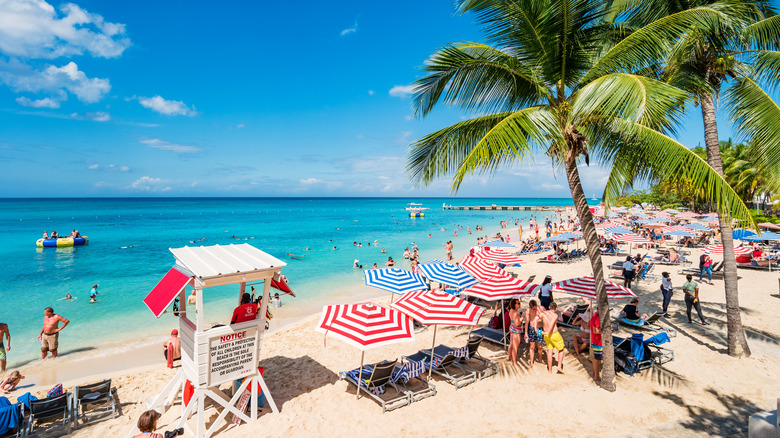
Benedek/Getty Images
It is impossible to daydream about the Caribbean without including Jamaica somewhere in the fantasy. The country is world-renowned for its reggae contribution to music, its jerk spice style of cooking, and its laid-back Rastafarian culture. And if you’re pursuing the therapy of the ocean, then Jamaica checks those boxes too, with white sand beaches in the north and black sand in the south.
Following that thought, there is no Jamaican beach city as loved as Montego Bay for numerous reasons: duty-free shopping, the cruise line terminal, and stimulating outdoor activities such as horseback riding through Montego Bay’s waves. It is a tourist playground that often circles around Doctor’s Cave Beach, an area so well-visited that they even opened the first Jamaican branch of Starbucks there.Thankfully, for those who want to experience the thrill of Montego Bay but find Doctor’s Cave too squished, there is always Cornwall Beach. Not only is it known to be several notches quieter, but it is also just a short walk away.
Bavaro Beach (Punta Cana, Dominican Republic)
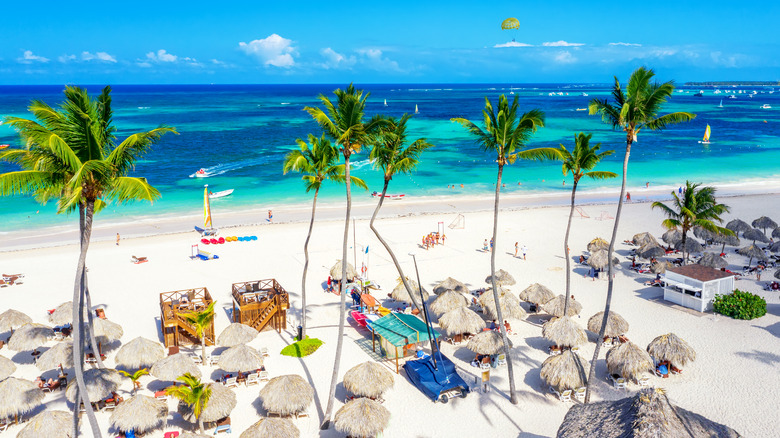
Nantonov/Getty Images
Bavaro Beach is a clear example of how popularity breeds more popularity. During the 2010s, Punta Cana resort town quickly escalated the ladder as one of the most lauded beach stops in the region. In 2016, it was named the number one destination in the Caribbean by the TripAdvisor Traveler’s Choice Awards, and after that stamp of approval, its acclaim has snowballed. According to its website, Punta Cana International Airport welcomes 7.6 million passengers yearly, making it the second busiest airport in the Caribbean.
Naturally, the masses flock to the beaches, and no sandy strip is as famous as Bavaro. The town was more than happy to accommodate this influx of foreign currency, and you are never far from a shopping mall, cocktail bar, a Punta Cana all-inclusive resort, or a golf course. If this frenzied energy causes you to pull your hair out, keep traveling north up the coast until you find peace. At only a three-hour drive away, Arena Gorda Beach is a well-loved alternative.
Ha’penny Bay (Saint Croix, U.S. Virgin Islands)
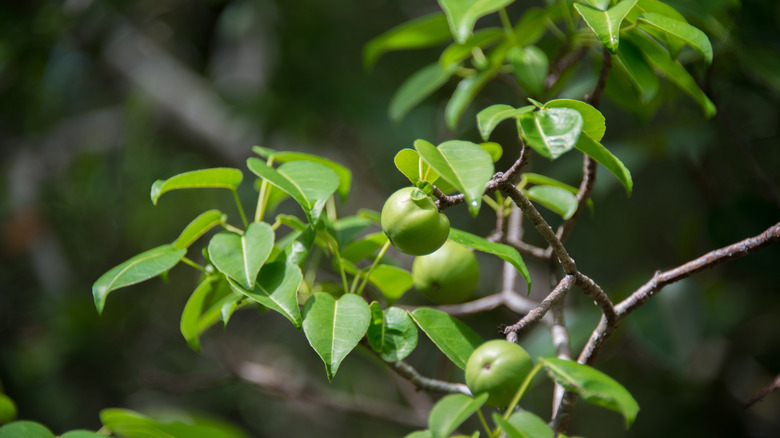
Karuna Eberl/Shutterstock
Ha’Penny Bay (say “Hey Penny”) may appear perfect at first. It’s a mile long. It’s secluded. And it is yet untouched by the industrial development spreading across neighboring areas. However, its second name, Manchineel Beach, warns us of a dire threat. The manchineel tree bears fruit that looks almost identical to an apple but is instead fatally poisonous.
To give you some idea, the Spanish have named the tree Manzanilla de la Muerte, which means “little apple of death”. Eating the reportedly pleasantly sweet-tasting fruit will lead to the swelling of your throat and then intestines, complete with internal bleeding. The tree itself is also hazardous. People standing beneath it for shelter from the rain have been inflicted with skin blisters due to the sap in the droplets. Because of these nightmare stories, several beaches in the Caribbean are referred to as “Manchineel Beach”, so it is best to avoid all of them.
Playa Forum (Cancun, Mexico)
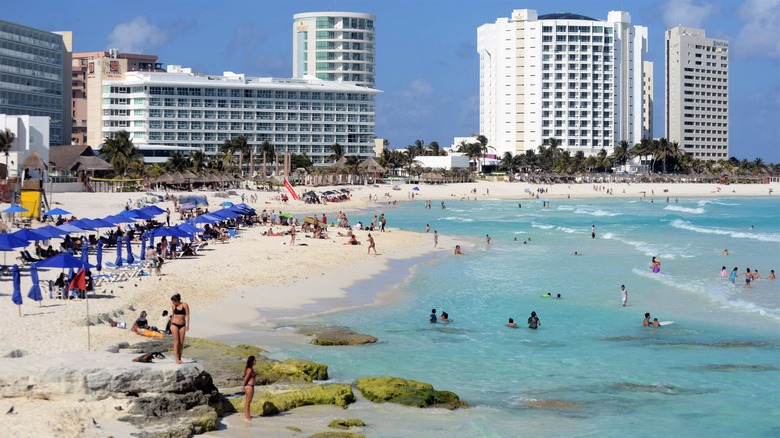
Medios Y Media/Getty Images
The area around Cancun, known as the Riviera Maya, is a must-visit for all world explorers, with its Mayan archaeological sites. Cancun is also in close proximity to Chichen Itza, a member of the New 7 Wonders of the World. But, as we know, the more captivating the area, the quicker the crowds will come, especially when there are beaches to unwind on. In particular, Playa Forum is known for its cramped atmosphere, with surrounding shopping malls, restaurants, and resorts galore. Furthermore, the world-famous Coco Bongo Club lights up the nights and is only a three-minute walk away.
Thankfully, Cancun is one of the safer cities in Mexico, but incidents do occur, largely due to its drug trafficking problems. For these reasons, you must exercise vigilance when visiting any of Cancun’s famous beaches or skip them altogether if you’re looking for a calmer getaway.
Condado Beach (San Juan, Puerto Rico)
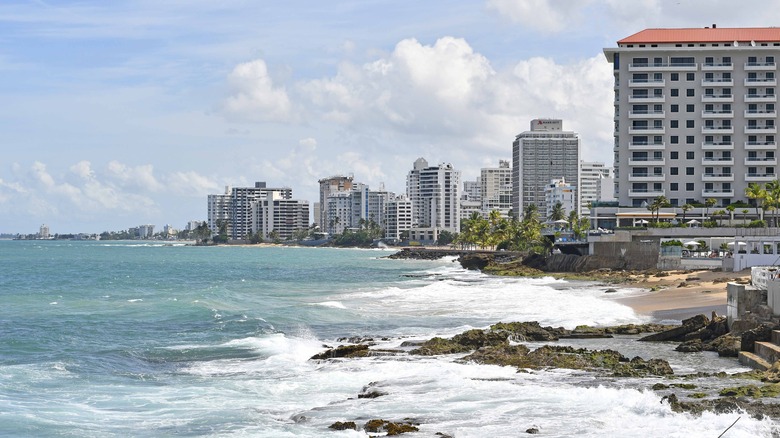
Ryan Tishken/Getty Images
If you’re an avid windsurfer, then Condado Beach may be the perfect stop for you. There is a popular community based around this watersport due to the strong winds, which, incidentally, contribute to the beach’s problems. These forceful weather conditions lead to a rough undercurrent, and the waves are known to drag people below the water, even smashing them against the jagged rocks found on both sides. These waters are so dangerous that there have been up to five drownings reported in one day.
To tackle this major crisis, the Governor of Puerto Rico, Pedro Pierluisi, installed lifeguard towers, hoping that this safety measure would help to maintain the area’s tourist buzz. But the warning is loud and clear: Do not tempt fate by swimming here, especially if you are traveling with kids. Instead, explore the surrounding area. If you simply must get your feet wet, consider driving two hours west to the city of Aguadilla, where there are plenty of much calmer beaches to visit, such as the well-loved Playa Crashboat.

